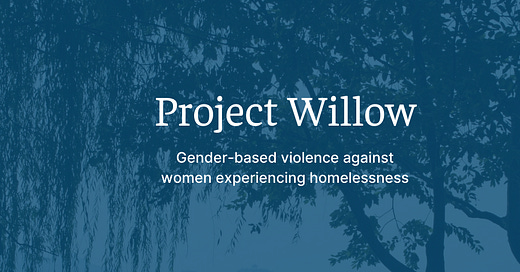This is the third post in a series. Click to read part one and part two.
Homelessness is often hidden from view as people meet their shelter needs in a variety of ways such as couch-surfing, remaining in unhealthy or unsafe relationships, or tenting in encampments outside of the view of the general public. This hidden homelessness is especially prevalent for women and gender-diverse individuals. The Project Willow report was created to help bring awareness to this important, yet often neglected issue.
Jen Gordon is a community advocate and researcher for Project Willow. She was motivated to gain a better understanding of what homelessness for women and gender-diverse individuals looked like in Waterloo Region. “Some folks have long said women’s homelessness is different, but we didn't have local data to back up this claim,” Gordon said.
Through interviews and a survey, Project Willow researchers engaged with participants who were connected to, or had used, formal emergency support services, including emergency shelter.
“The report captures the experiences of women (cis, trans, two-spirit) and gender-diverse individuals as they navigate safety, violence and justice while being homeless or unhoused and using emergency services in Waterloo Region.”
At the time the report was written in 2022, women had two options for emergency shelter: the YW KW emergency shelter in Kitchener or The Bridges co-ed shelter in Cambridge. As of June 2024, the YW KW emergency shelter closed permanently and The Bridges shelter in Cambridge transitioned to a men’s only space. While there are now no emergency women’s-only shelters, women experiencing domestic violence may be able to access support from the Women’s Crisis Services of Waterloo Region.
With few options for emergency shelter, some women opt for alternatives to the shelter system, including remaining in unsafe relationships or relying on hospital emergency rooms for temporary shelter. An open letter from a coalition advocating for dedicated women’s-only emergency shelter space in Waterloo Region says "a data strategy reflecting women's hidden homelessness is essential, ensuring that long-term housing solutions and non-profit infrastructure are adequately supported."
Since many people experiencing homelessness are hidden from the public in some way, it can be difficult to understand the scope of the problem. “By having no shelter beds that are exclusively for women, it makes it difficult to count the number of women experiencing homelessness. It absolutely underestimates the extent of women's homelessness in the region,” Erin Dej, an associate professor of criminology at Wilfrid Laurier University and one of the co-signers of the letter, said.
Project Willow research found that 73% of participants avoided using co-ed emergency shelter services because of safety concerns. This is exacerbated in Cambridge, where historically the only emergency homeless shelter option for women has been co-ed. A new, temporary women’s-only shelter is expected to open in Cambridge next month.
The majority of survey participants noted that they frequently experience violence, with 92% experiencing violence at least weekly. Verbal violence, such as yelling and name-calling, was the most common type of violence experienced, often from partners or peers, but also from strangers on the street.
“I can’t go home because I don’t have a home. So, I am always exposed to people who are willing to take what I have,” a survey participant stated.
Participants discussed myriad safety concerns and the need to always be aware of their surroundings, having an exit strategy, and carrying pepper spray or other weapons. Many participants found comfort in staying in public with people, even if they were strangers. This was especially true for those who did not own a cell phone or have other ways of calling for help.
“It’s dangerous and don’t go where you’re not close to the city, and other people, because if you need to run, you need to get people fast, right? Because that could be life or death,” ‘interview participant 1’ said.
Women and gender-diverse individuals often face difficult decisions in accessing shelter and maintaining their (and, for some, their children’s) safety. Forty one percent of Project Willow participants reported that they strategically engage in relationships and friendships with known violent people for protection. Eighty three percent of respondents said they have stayed in a housing situation that is abusive or violent because it felt safer than being homeless.
The Office of the Federal Housing Advocate noted that there simply aren’t enough safe shelter options for women, gender diverse people, and people fleeing violence. “Shelters provide a critical service, but they are underfunded, are operating over capacity, and staff turnover rates are high. Many also reported a lack of emergency resources for women and LGBTQIA2S+ people,” the report states.
Across Canada, “68% of shelter beds are co-ed or dedicated to men, compared to 13% dedicated to women,” according to ‘The State of Women’s Housing Need and Homelessness in Canada’ report.
Marjorie Knight is a local housing advocate who has experienced homelessness and stayed at the Bridges shelter in Cambridge, which at that time admitted men and women. She recalls the discomfort she felt with sharing a co-ed space with only a partial wall dividing her from the men. “It was very, very uncomfortable. I did not feel safe there,” Knight said.
Knight also noted that women with children face additional challenges. “If they have children with them, they may be afraid to ask for help, in case the children are taken away by the authorities. That means they may be living in a vehicle, or staying in an abusive situation, instead of getting the help they need,” said Knight.
The lack of gender-specific shelter options leaves many women and gender-diverse individuals to reside in encampments, believing them to be the safer, or only, option available to them.
“They acknowledged the violence in encampments, but also recognized greater violence while being alone on the streets or in certain temporary housing, such as shelters and single-room occupancies. More importantly, they see encampments as a place that provides community, support, and safety,” the Office of the Federal Housing Advocate stated.
Project Willow participants believe that changes to the shelter and housing system can improve access and safety. Many respondents cited restorative justice methods as crucial in establishing a safer system.
“Looking at solutions around justice, a total of 57% of participants want to see an alternative way to deal with violence rather than relying on the current police or court systems,” the report stated.
The creation of new spaces and services, and the adaptation of existing ones, exclusively for women and gender-diverse folks is critical according to most respondents.
“Sixty one percent of participants also wanted to see the creation of more gendered housing along the continuum of affordable, supportive and transitional,” according to the Project Willow report.
“Conversations are happening, champions are advocating for this, but we still need momentum. Getting more citizens involved means we get the momentum we need to grow something important out of this in a way that is revolutionary,” Jen Gordon said.
A slightly edited version of this piece appeared in The Community Edition’s November issue.
Have Your Say:
Citizens for Public Justice (CPJ) is committed to advocating for rights-based policy responses to the housing crisis in Canada. With the establishment of the National Housing Council’s Review Panel on the right to housing for women, Two Spirit, and gender-diverse people, CPJ invites members and partners to participate by contributing to a CPJ submission, or by making their own submission.
Kitchener and Waterloo are co-hosting two information sessions as they consider new licensing rules for short-term rentals. The sessions are free to attend but registration is required.
Monday, Nov. 18 from 6 to 8 p.m. at WMRC Pavilion, Meeting Hall (101 Father David Bauer Drive, Entrance C)
Wednesday, Nov. 27 from 1 to 3 p.m. at Kitchener City Hall, Conestoga Room (200 King Street West)
You can also complete a survey on short-term rentals (until Dec 6th).
Happening in the Region:
Getting vaccinated is one of the most effective tools we have to reduce our risk of severe illness. It also helps reduce the spread of respiratory infections. Learn more about getting the flu, COVID-19, and/or RSV vaccines locally.
A Broken Planet exhibit opens tonight at the Kitchener Waterloo Art Gallery. “Featuring the industrial devastation unfolding before Edward Burtynsky’s camera lens, the exhibition uses aesthetic and compositional beauty as a way to approach difficult subjects that are otherwise much easier to look away from.” The exhibit runs from now until March 30th, 2025.
The holiday season is just a round the corner and what better way to find a unique gift than by shopping local at one of the many unique markets popping up right now, including the Eco-Friendly Holiday Market, the KW Famous Holiday Pop-Up Shoppe, and Christkindl. Here’s a list of holiday markets in Kitchener.
As always, thanks for reading!








Thank you for covering such an important topic. I was unaware that the YW shelter had permanently closed!
There are so many factors that can make being unsheltered as a woman or gender-diverse person more complicated, this article did a great job revealing and explaining them.